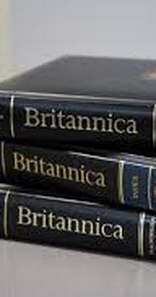 by Leslie Martinelli A few years ago, I read that Encyclopedia Britannica no longer would be printing encyclopedias. Add that to the list of things from my childhood that no longer exist. Don't get me wrong - I'm not anti-progress. Where would we be without air conditioning, microwave ovens, and cell phones? And some of those extinct items deserved to go, like cars without seat belts and manual typewriters. But every now and then technology interferes where it doesn't belong, and I just have to say: Stop! Enough! Encyclopedias are a case in point. Those printed volumes held many fond memories for me. The first set to enter my family’s house came by way of a door-to-door salesman. That set caused some conflict between my parents. My father had warned my mother time and again not to let salesmen in the front door, let alone buy from any of them. They were, he said, like seagulls - once you fed one of them, you couldn't get rid of the flock. Our house was testament to that caveat; we owned a top-of-the-line vacuum and enough brushes and cleaning products to supply the whole neighborhood. My mother stood by her latest purchase, though. As she saw it, that set of encyclopedias was an investment in my and my brothers’ educational futures.
0 Comments
by Jason Cantrell In October 2012, a poet named Sampsa Nuotio created a site called “Google Poetics,” which posts submissions by poets from around the world, each of which is created in a nontraditional way. Each submission is derived from Google’s autocomplete suggestions, which appear when any Google user is typing in a search phrase. The suggested searches are predictions about what a user might be searching for, based on common searches performed by other users:
|
Archives
April 2024
Categories
All
|
|
Glassworks is a publication of Rowan University's Master of Arts in Writing 260 Victoria Street • Glassboro, New Jersey 08028 glassworksmagazine@rowan.edu |
All Content on this Site (c) 2024 Glassworks
|


 RSS Feed
RSS Feed
